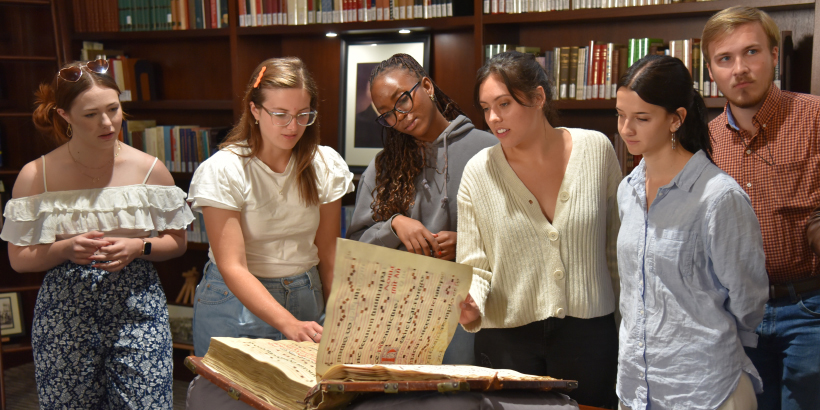Libraries Impacting Learning

Pepperdine Libraries is committed to making a meaningful impact on student learning, and we do it in a variety of ways. We make it seamless for students to access physical and online materials and to connect with librarians. Our staff of experts partners with faculty to make course reserves, including scans of book chapters, articles, and other materials, available 24/7 to students via their Pepperdine Canvas class site. Our Genesis Lab and Special Collections librarians help students utilize new technologies and integrate archival collections into their coursework.
We have a vast collection: our catalog consists of nearly 2 million items – including nearly 600,000 ebooks – with another 3 billion items available via interlibrary loan. Patrons can use our 100+ electronic databases to search through 60,000 journals. Anyone from anywhere in the world can search the thousands of works in Digital Commons, our open access institutional repository for Pepperdine scholarship, and 50,000 digitized photos, documents, films, and recordings in Digital Collections.
Resources are only helpful if one knows how to properly use them, so our team of library faculty makes it their mission to show Pepperdine students how to make good use of our collections. During the 2023-2024 academic year, our knowledge navigation team instructed more than 5,000 students in 300 information literacy class sessions, equating to nearly 400 hours of instruction. During these sessions, librarians taught students how to articulate and focus information needs, develop information-gathering strategies, search electronic and print databases, use internet resources to research a topic, evaluate sources of information, and apply information ethics.
Librarians taught an additional 800 students in scores of classes using rare books and primary source archival objects, totalling nearly 100 hours of instruction. The students were from classes in art, biology, English, French, history, music, and religion, immersing themselves with books and materials from the 15th to the 21st centuries. Additionally, the Genesis Lab team invited 400 students from dozens of classes in art history, biology, education, humanities, and nutrition, totaling more than 50 hours of instruction. Class activities included exploring ancient Athens, Notre-Dame de Paris, and the anatomy of the digestive system in virtual reality and creating 3D prints of art historical artifacts, biological specimens, and human digestive tract organs.
Our interlibrary loan staff members had a busy year, fulfilling nearly 10,000 requests, including from our patrons looking to borrow items from other libraries and from other libraries hoping to lend to their patrons. Finally, more than 1,000 scholarly works were uploaded to Digital Commons, and there were more than one million worldwide downloads of papers in our institutional repository.
Pepperdine Libraries looks forward to further impacting learning during the 2024-2025 academic year. Faculty: email payson.library@pepperdine.edu to schedule an information literacy class session and specialcollections@pepperdine.edu to schedule a class to teach with rare books and archival collections.